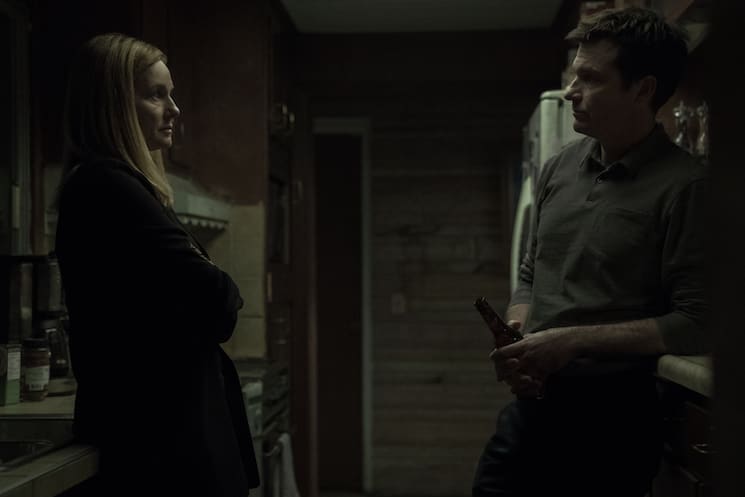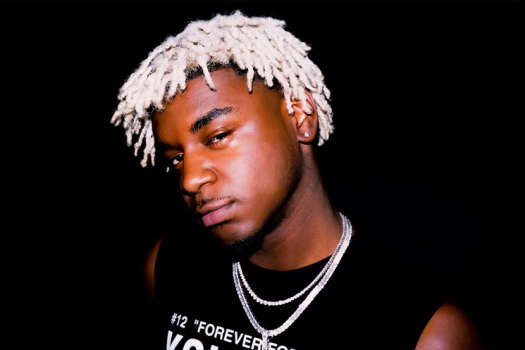Netflix's unflinchingly bleak crime drama Ozark is set to return for a second season, and with it comes more white-knuckle tension as we watch money launderer Marty Byrde and his family try to survive as white-collar criminals in the Missouri wilderness.
Jason Bateman stars as Byrde, but he's also an executive producer, and directed six episodes. As such, he's been watching the show's tone evolve with a watchful eye. "I can tell you that the writers did a really, really good job of escalating everything without just arbitrarily supersizing it and going 'Oh we've gotta ramp things up,'" he told Exclaim! during a set visit to the show's Atlanta studio. "It really organically extends from where things left off last year, and where things left off last year was not even an obnoxious cliff-hanger, either. I really thought they did an elegant job of landing the plane, and finishing that story."
"What I will do," adds Laura Linney, "is tell you that I think it's better than Season 1. I think the characters are becoming more entangled, and interdependent, and co-dependent, and that there's a thickening. It's deeper, and more to the bone. I think it's like if you have a great stew and it's been sitting for a while; Season 2 has that. It's like seasoning. It's a terrible pun, but there's a seasoning to the show."
The show's tone pairs violence and mayhem with nuanced family drama in such a way that it will hopefully appeal to all kinds of viewers. "I have an appetite for following the money, following the gun. I'm a typical caveman," Bateman says. I'm very plot-driven. I like following the story. I think more traditionally, the other sex will tolerate more heart and more character connection. And I kind of go numb to that stuff. But our head writer Chris Mundy is very disciplined about going, 'You're not really going to care who that gun kills if you don't have a connection to that character and there isn't an emotional investment made.'"
For Laura Linney, playing Marty's wife Wendy offers a sandbox in which to explore new emotional depths.
"She's not a terribly mature human being," Linney admits. "She's smart, and she's shrewd, but she's reactive. And she's impulsive. And she has very little control of herself. She can be in control of herself, but she responds and she flashes and she flares and she does things impulsively and instinctively in an almost adolescent way. And that's fun to play."
The role of Marty offers the opposite for Bateman — another chance to play the straight-laced serious guy that he's always played. "It's not that big of a pivot for me, and I like that," he admits. "I'm a little cynical about the whole acting thing anyway…. As far as acting goes, there are about five people that can really morph into a different character and really 'act,' I put in quotes. The rest of us should probably stay inside our skill set and that is basically a short way of saying play a character that exists somewhere inside you. Otherwise it just becomes self-indulgent, I think, to expect people to buy you as just something that's outside of the way you naturally come across."
Although it's not overtly political, Ozark exists in an era where many are reconsidering the so-called "flyover states" of America. As such, the show's setting is decidedly part of the zeitgeist.
"A smarter person, probably either Chris Mundy or Laura Linney, could give you a better answer to this question, but my dummy take on it is that Marty Byrde came to the Ozark from Chicago thinking he was going to 'big city' these guys, and he dangerously underestimated them," Bateman says. "There is a parallel to that in our political climate right now where both coasts thought they had it, and it was all done, and we don't need to worry about the people, as you say, that we fly over. They were wrong, and they're paying a big price for that — and so is Marty."
"I think how our country has shifted so drastically, politically, and the issues that have come up with people misunderstanding each other and an adversarial sense of this country in a much more blatant way than it has been before, and how it's used against each other as a weapon," Linney adds. "I think it gives a different sort of lens through which to see the show."
Ultimately, that lens informs how Linney views her character. "I can tell you that what I'm interested in, and what's in the zeitgeist and what I've been thinking about, is the question for Americans: Who are you? Who are we? Really, who are we? What do we believe, how do we behave, what are we capable of?"
As with Season 1, the second entry of Ozark was designed to feel satisfying even if the show never returns.
"It's not a defensive position of 'Well, if we don't get the call after we wrap production, at least we will have tied up that loose end,'" Bateman explains. "It's actually the opposite of that. It's saying, 'Let's not be greedy or presumptuous about keeping our powder dry. Let's not bleed out one season's worth of stories over three or four years. Let's spend it all. Let's leave it all on the table and not assume we're going to be back. Let's just be happy with what we did.'"
Season 2 of 'Ozark' hits Netflix on August 31.
Jason Bateman stars as Byrde, but he's also an executive producer, and directed six episodes. As such, he's been watching the show's tone evolve with a watchful eye. "I can tell you that the writers did a really, really good job of escalating everything without just arbitrarily supersizing it and going 'Oh we've gotta ramp things up,'" he told Exclaim! during a set visit to the show's Atlanta studio. "It really organically extends from where things left off last year, and where things left off last year was not even an obnoxious cliff-hanger, either. I really thought they did an elegant job of landing the plane, and finishing that story."
"What I will do," adds Laura Linney, "is tell you that I think it's better than Season 1. I think the characters are becoming more entangled, and interdependent, and co-dependent, and that there's a thickening. It's deeper, and more to the bone. I think it's like if you have a great stew and it's been sitting for a while; Season 2 has that. It's like seasoning. It's a terrible pun, but there's a seasoning to the show."
The show's tone pairs violence and mayhem with nuanced family drama in such a way that it will hopefully appeal to all kinds of viewers. "I have an appetite for following the money, following the gun. I'm a typical caveman," Bateman says. I'm very plot-driven. I like following the story. I think more traditionally, the other sex will tolerate more heart and more character connection. And I kind of go numb to that stuff. But our head writer Chris Mundy is very disciplined about going, 'You're not really going to care who that gun kills if you don't have a connection to that character and there isn't an emotional investment made.'"
For Laura Linney, playing Marty's wife Wendy offers a sandbox in which to explore new emotional depths.
"She's not a terribly mature human being," Linney admits. "She's smart, and she's shrewd, but she's reactive. And she's impulsive. And she has very little control of herself. She can be in control of herself, but she responds and she flashes and she flares and she does things impulsively and instinctively in an almost adolescent way. And that's fun to play."
The role of Marty offers the opposite for Bateman — another chance to play the straight-laced serious guy that he's always played. "It's not that big of a pivot for me, and I like that," he admits. "I'm a little cynical about the whole acting thing anyway…. As far as acting goes, there are about five people that can really morph into a different character and really 'act,' I put in quotes. The rest of us should probably stay inside our skill set and that is basically a short way of saying play a character that exists somewhere inside you. Otherwise it just becomes self-indulgent, I think, to expect people to buy you as just something that's outside of the way you naturally come across."
Although it's not overtly political, Ozark exists in an era where many are reconsidering the so-called "flyover states" of America. As such, the show's setting is decidedly part of the zeitgeist.
"A smarter person, probably either Chris Mundy or Laura Linney, could give you a better answer to this question, but my dummy take on it is that Marty Byrde came to the Ozark from Chicago thinking he was going to 'big city' these guys, and he dangerously underestimated them," Bateman says. "There is a parallel to that in our political climate right now where both coasts thought they had it, and it was all done, and we don't need to worry about the people, as you say, that we fly over. They were wrong, and they're paying a big price for that — and so is Marty."
"I think how our country has shifted so drastically, politically, and the issues that have come up with people misunderstanding each other and an adversarial sense of this country in a much more blatant way than it has been before, and how it's used against each other as a weapon," Linney adds. "I think it gives a different sort of lens through which to see the show."
Ultimately, that lens informs how Linney views her character. "I can tell you that what I'm interested in, and what's in the zeitgeist and what I've been thinking about, is the question for Americans: Who are you? Who are we? Really, who are we? What do we believe, how do we behave, what are we capable of?"
As with Season 1, the second entry of Ozark was designed to feel satisfying even if the show never returns.
"It's not a defensive position of 'Well, if we don't get the call after we wrap production, at least we will have tied up that loose end,'" Bateman explains. "It's actually the opposite of that. It's saying, 'Let's not be greedy or presumptuous about keeping our powder dry. Let's not bleed out one season's worth of stories over three or four years. Let's spend it all. Let's leave it all on the table and not assume we're going to be back. Let's just be happy with what we did.'"
Season 2 of 'Ozark' hits Netflix on August 31.




